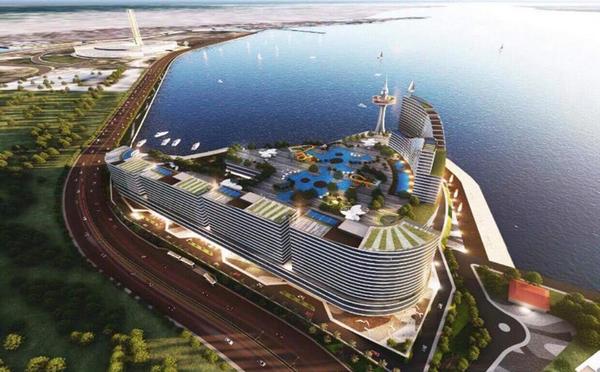
A perspective of the P18 billion Kawit integrated resort.
AFTER COUNCIL’S DISAPPROVAL
The Gokongwei-led proponent who wished to develop Kawit Island in the South Road Properties (SRP), may have already lost interest on proposing another plan to construct an integrated resort on the eight-hectare property.
This scenario was raised by Cebu City Mayor Tomas Osmeña five days after the Cebu City Council decided to junk the resolution which would have authorized him to enter into a joint-venture agreement (JVA) with Universal Hotels and Resorts Inc. (UHRI) to develop Kawit at a price of P18-billion.
“I’m not the spokesperson of UHRI but of course they will back out. Do you think they will not find for another place? Other places must be laughing at us,” Osmeña said.
When asked if he’s planning to revive the resolution, which was authored by Councilor Eugenio Gabuya Jr., his political ally under the Bando Osmeña Pundok Kauswagan (BOPK) party, the mayor said he is still hesitant.
“Under the present circumstances, it cannot be revived,” he added.
Osmeña pointed out that the Kawit Island, which now forms part of the SRP, must be turned into an income-generating property after years of being underutilized.
He also blamed the opposition for the loss of 5,000 jobs which were expected once construction of the resorts, hotels, and casino on the property starts.
“A project of this magnitude means it will make business grow and it will grow through the years. What does that mean to them?” Osmeña said.
“Why do we have to subject a very reputable Cebuano businessman who’s proud of being a Cebuano, who proudly calls the biggest airline in the country as Cebu Pacific, to that kind of humiliation? It’s so embarrassing,” he added.
The mayor had been venting out his disappointments and criticisms to the opposition councilors for prohibiting the city government from allowing UHRI to lease the Kawit property for 50 years to construct a hotel, resort, casino, and amphitheater.
He also accused them of playing politics, by citing the fact that both the firm and the city government complied with the conditions laid out by the council’s ad-hoc committee, which was formed last March to scrutinize the deal.